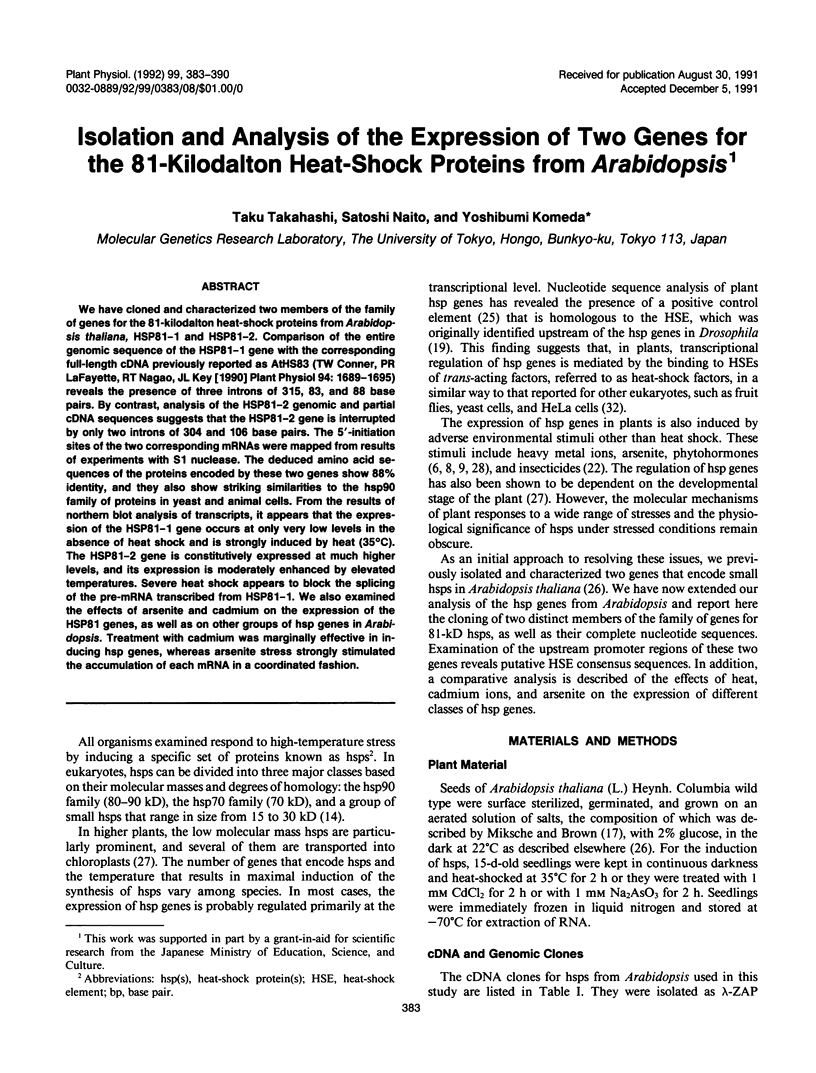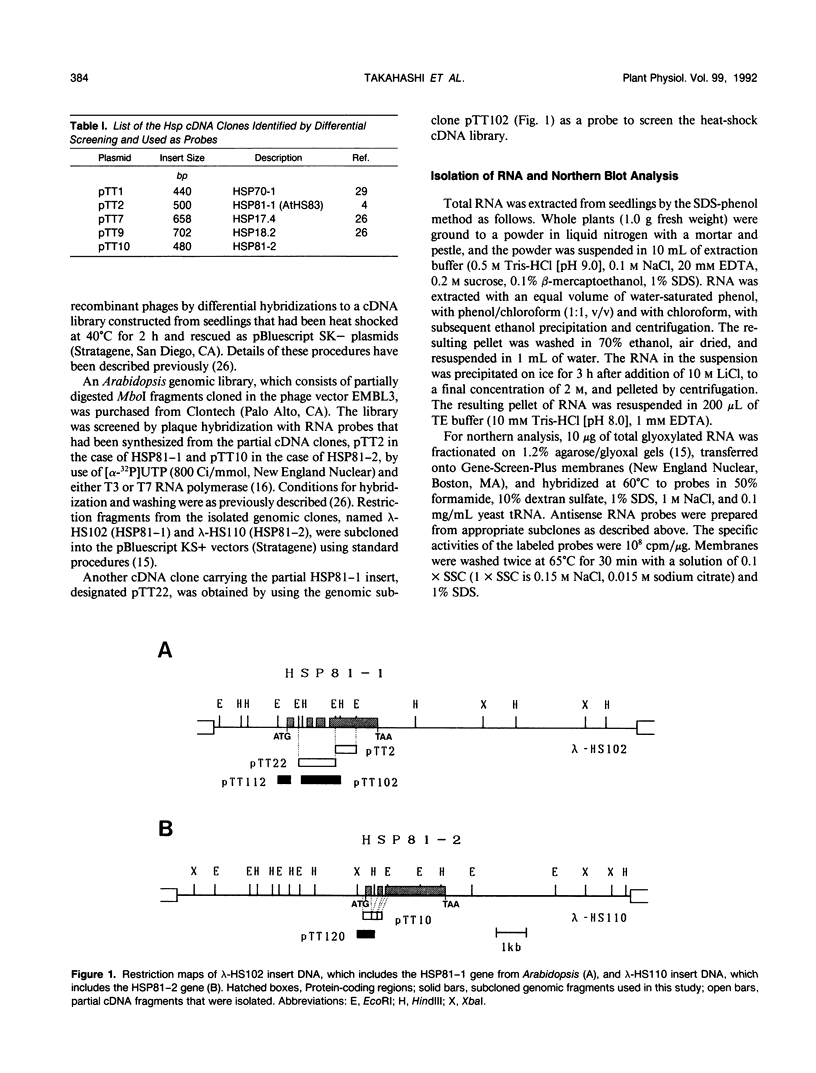Abstract
We have cloned and characterized two members of the family of genes for the 81-kilodalton heat-shock proteins from Arabidopsis thaliana, HSP81-1 and HSP81-2. Comparison of the entire genomic sequence of the HSP81-1 gene with the corresponding full-length cDNA previously reported as AtHS83 (TW Conner, PR LaFayette, RT Nagao, JL Key [1990] Plant Physiol 94: 1689-1695) reveals the presence of three introns of 315, 83, and 88 base pairs. By contrast, analysis of the HSP81-2 genomic and partial cDNA sequences suggests that the HSP81-2 gene is interrupted by only two introns of 304 and 106 base pairs. The 5′-initiation sites of the two corresponding mRNAs were mapped from results of experiments with S1 nuclease. The deduced amino acid sequences of the proteins encoded by these two genes show 88% identity, and they also show striking similarities to the hsp90 family of proteins in yeast and animal cells. From the results of northern blot analysis of transcripts, it appears that the expression of the HSP81-1 gene occurs at only very low levels in the absence of heat shock and is strongly induced by heat (35°C). The HSP81-2 gene is constitutively expressed at much higher levels, and its expression is moderately enhanced by elevated temperatures. Severe heat shock appears to block the splicing of the pre-mRNA transcribed from HSP81-1. We also examined the effects of arsenite and cadmium on the expression of the HSP81 genes, as well as on other groups of hsp genes in Arabidopsis. Treatment with cadmium was marginally effective in inducing hsp genes, whereas arsenite stress strongly stimulated the accumulation of each mRNA in a coordinated fashion.
Full text
PDF







Images in this article
Selected References
These references are in PubMed. This may not be the complete list of references from this article.
- Amin J., Ananthan J., Voellmy R. Key features of heat shock regulatory elements. Mol Cell Biol. 1988 Sep;8(9):3761–3769. doi: 10.1128/mcb.8.9.3761. [DOI] [PMC free article] [PubMed] [Google Scholar]
- Blackman R. K., Meselson M. Interspecific nucleotide sequence comparisons used to identify regulatory and structural features of the Drosophila hsp82 gene. J Mol Biol. 1986 Apr 20;188(4):499–515. doi: 10.1016/s0022-2836(86)80001-8. [DOI] [PubMed] [Google Scholar]
- Borkovich K. A., Farrelly F. W., Finkelstein D. B., Taulien J., Lindquist S. hsp82 is an essential protein that is required in higher concentrations for growth of cells at higher temperatures. Mol Cell Biol. 1989 Sep;9(9):3919–3930. doi: 10.1128/mcb.9.9.3919. [DOI] [PMC free article] [PubMed] [Google Scholar]
- Conner T. W., Lafayette P. R., Nagao R. T., Key J. L. Sequence and Expression of a HSP83 from Arabidopsis thaliana. Plant Physiol. 1990 Dec;94(4):1689–1695. doi: 10.1104/pp.94.4.1689. [DOI] [PMC free article] [PubMed] [Google Scholar]
- Culotta V. C., Hamer D. H. Fine mapping of a mouse metallothionein gene metal response element. Mol Cell Biol. 1989 Mar;9(3):1376–1380. doi: 10.1128/mcb.9.3.1376. [DOI] [PMC free article] [PubMed] [Google Scholar]
- Czarnecka E., Fox P. C., Gurley W. B. In Vitro Interaction of Nuclear Proteins with the Promoter of Soybean Heat Shock Gene Gmhsp17.5E. Plant Physiol. 1990 Nov;94(3):935–943. doi: 10.1104/pp.94.3.935. [DOI] [PMC free article] [PubMed] [Google Scholar]
- Czarnecka E., Nagao R. T., Key J. L., Gurley W. B. Characterization of Gmhsp26-A, a stress gene encoding a divergent heat shock protein of soybean: heavy-metal-induced inhibition of intron processing. Mol Cell Biol. 1988 Mar;8(3):1113–1122. doi: 10.1128/mcb.8.3.1113. [DOI] [PMC free article] [PubMed] [Google Scholar]
- Edelman L., Czarnecka E., Key J. L. Induction and Accumulation of Heat Shock-Specific Poly(A) RNAs and Proteins in Soybean Seedlings during Arsenite and Cadmium Treatments. Plant Physiol. 1988 Apr;86(4):1048–1056. doi: 10.1104/pp.86.4.1048. [DOI] [PMC free article] [PubMed] [Google Scholar]
- Farrelly F. W., Finkelstein D. B. Complete sequence of the heat shock-inducible HSP90 gene of Saccharomyces cerevisiae. J Biol Chem. 1984 May 10;259(9):5745–5751. [PubMed] [Google Scholar]
- Hanley B. A., Schuler M. A. Plant intron sequences: evidence for distinct groups of introns. Nucleic Acids Res. 1988 Jul 25;16(14B):7159–7176. doi: 10.1093/nar/16.14.7159. [DOI] [PMC free article] [PubMed] [Google Scholar]
- Hickey E., Brandon S. E., Smale G., Lloyd D., Weber L. A. Sequence and regulation of a gene encoding a human 89-kilodalton heat shock protein. Mol Cell Biol. 1989 Jun;9(6):2615–2626. doi: 10.1128/mcb.9.6.2615. [DOI] [PMC free article] [PubMed] [Google Scholar]
- Lin C. Y., Roberts J. K., Key J. L. Acquisition of Thermotolerance in Soybean Seedlings : Synthesis and Accumulation of Heat Shock Proteins and their Cellular Localization. Plant Physiol. 1984 Jan;74(1):152–160. doi: 10.1104/pp.74.1.152. [DOI] [PMC free article] [PubMed] [Google Scholar]
- Lindquist S., Craig E. A. The heat-shock proteins. Annu Rev Genet. 1988;22:631–677. doi: 10.1146/annurev.ge.22.120188.003215. [DOI] [PubMed] [Google Scholar]
- Picard D., Khursheed B., Garabedian M. J., Fortin M. G., Lindquist S., Yamamoto K. R. Reduced levels of hsp90 compromise steroid receptor action in vivo. Nature. 1990 Nov 8;348(6297):166–168. doi: 10.1038/348166a0. [DOI] [PubMed] [Google Scholar]
- Rebbe N. F., Hickman W. S., Ley T. J., Stafford D. W., Hickman S. Nucleotide sequence and regulation of a human 90-kDa heat shock protein gene. J Biol Chem. 1989 Sep 5;264(25):15006–15011. [PubMed] [Google Scholar]
- Rees C. A., Gullons A. M., Walden D. B. Heat Shock Protein Synthesis Induced by Methomyl in Maize (Zea mays L.) Seedlings. Plant Physiol. 1989 Aug;90(4):1256–1261. doi: 10.1104/pp.90.4.1256. [DOI] [PMC free article] [PubMed] [Google Scholar]
- Rochester D. E., Winer J. A., Shah D. M. The structure and expression of maize genes encoding the major heat shock protein, hsp70. EMBO J. 1986 Mar;5(3):451–458. doi: 10.1002/j.1460-2075.1986.tb04233.x. [DOI] [PMC free article] [PubMed] [Google Scholar]
- Sanger F., Nicklen S., Coulson A. R. DNA sequencing with chain-terminating inhibitors. Proc Natl Acad Sci U S A. 1977 Dec;74(12):5463–5467. doi: 10.1073/pnas.74.12.5463. [DOI] [PMC free article] [PubMed] [Google Scholar]
- Takahashi T., Komeda Y. Characterization of two genes encoding small heat-shock proteins in Arabidopsis thaliana. Mol Gen Genet. 1989 Nov;219(3):365–372. doi: 10.1007/BF00259608. [DOI] [PubMed] [Google Scholar]
- Wu C. H., Caspar T., Browse J., Lindquist S., Somerville C. Characterization of an HSP70 Cognate Gene Family in Arabidopsis. Plant Physiol. 1988 Nov;88(3):731–740. doi: 10.1104/pp.88.3.731. [DOI] [PMC free article] [PubMed] [Google Scholar]
- Xiao H., Lis J. T. Germline transformation used to define key features of heat-shock response elements. Science. 1988 Mar 4;239(4844):1139–1142. doi: 10.1126/science.3125608. [DOI] [PubMed] [Google Scholar]
- Yost H. J., Lindquist S. RNA splicing is interrupted by heat shock and is rescued by heat shock protein synthesis. Cell. 1986 Apr 25;45(2):185–193. doi: 10.1016/0092-8674(86)90382-x. [DOI] [PubMed] [Google Scholar]
- Zimarino V., Tsai C., Wu C. Complex modes of heat shock factor activation. Mol Cell Biol. 1990 Feb;10(2):752–759. doi: 10.1128/mcb.10.2.752. [DOI] [PMC free article] [PubMed] [Google Scholar]




